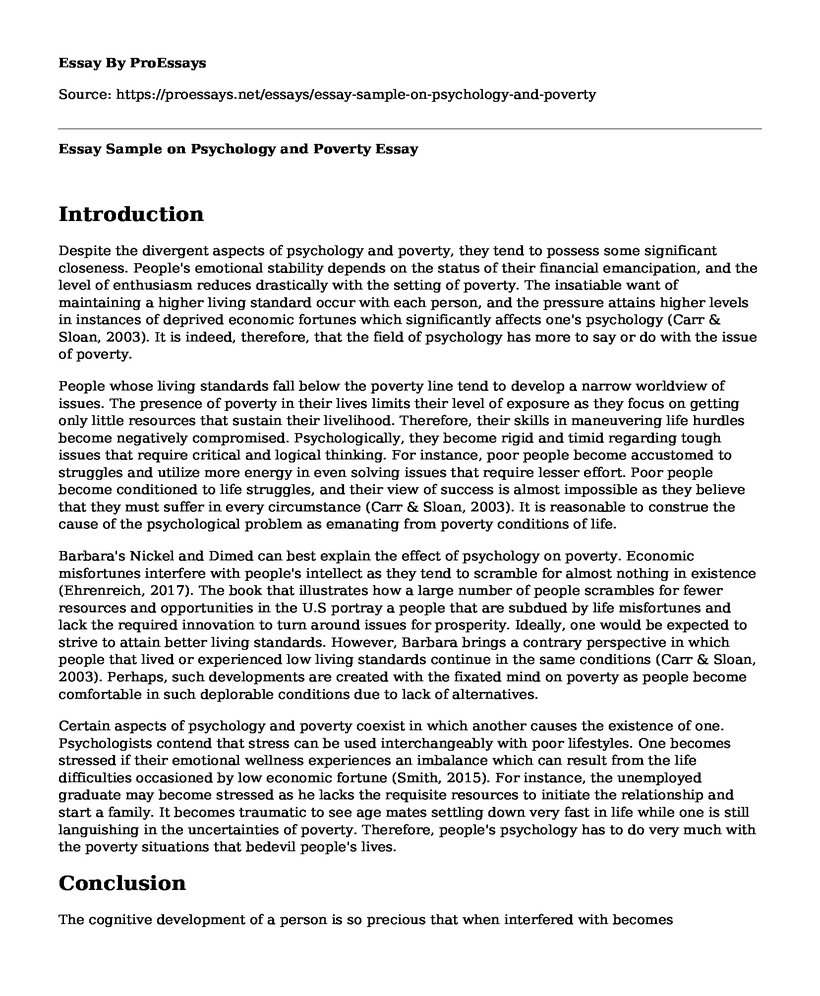Introduction
Despite the divergent aspects of psychology and poverty, they tend to possess some significant closeness. People's emotional stability depends on the status of their financial emancipation, and the level of enthusiasm reduces drastically with the setting of poverty. The insatiable want of maintaining a higher living standard occur with each person, and the pressure attains higher levels in instances of deprived economic fortunes which significantly affects one's psychology (Carr & Sloan, 2003). It is indeed, therefore, that the field of psychology has more to say or do with the issue of poverty.
People whose living standards fall below the poverty line tend to develop a narrow worldview of issues. The presence of poverty in their lives limits their level of exposure as they focus on getting only little resources that sustain their livelihood. Therefore, their skills in maneuvering life hurdles become negatively compromised. Psychologically, they become rigid and timid regarding tough issues that require critical and logical thinking. For instance, poor people become accustomed to struggles and utilize more energy in even solving issues that require lesser effort. Poor people become conditioned to life struggles, and their view of success is almost impossible as they believe that they must suffer in every circumstance (Carr & Sloan, 2003). It is reasonable to construe the cause of the psychological problem as emanating from poverty conditions of life.
Barbara's Nickel and Dimed can best explain the effect of psychology on poverty. Economic misfortunes interfere with people's intellect as they tend to scramble for almost nothing in existence (Ehrenreich, 2017). The book that illustrates how a large number of people scrambles for fewer resources and opportunities in the U.S portray a people that are subdued by life misfortunes and lack the required innovation to turn around issues for prosperity. Ideally, one would be expected to strive to attain better living standards. However, Barbara brings a contrary perspective in which people that lived or experienced low living standards continue in the same conditions (Carr & Sloan, 2003). Perhaps, such developments are created with the fixated mind on poverty as people become comfortable in such deplorable conditions due to lack of alternatives.
Certain aspects of psychology and poverty coexist in which another causes the existence of one. Psychologists contend that stress can be used interchangeably with poor lifestyles. One becomes stressed if their emotional wellness experiences an imbalance which can result from the life difficulties occasioned by low economic fortune (Smith, 2015). For instance, the unemployed graduate may become stressed as he lacks the requisite resources to initiate the relationship and start a family. It becomes traumatic to see age mates settling down very fast in life while one is still languishing in the uncertainties of poverty. Therefore, people's psychology has to do very much with the poverty situations that bedevil people's lives.
Conclusion
The cognitive development of a person is so precious that when interfered with becomes catastrophic. Scientists contend that poverty can become unbreakable grip that affects families and may move to even the neighborhoods due to the affected cognitive function of an individual. The ties associated with low economic empowerment may become difficult to eliminate and hinder one from ascending into financial fortune due to the suppressing effects on one's attention on viable opportunities (Smith, 2015). It is on this background that one can attest that psychology though differs from poverty due to their different discipline nature has to do more with it. The hindrance factor caused by poverty on one's prosperity greatly affects one's psychological parameters of thought, emotional balance, and associated factors.
References
Carr, S. C., & Sloan, T. S. (2003). Poverty and Psychology: From Global Perspective to Local Practice. Boston, MA: Springer US.
Ehrenreich B., (2017). Nickel and Dimed: On (not) getting by in America. New York:
Smith, L. (2015). Psychology, Poverty, and the End of Social Exclusion: Putting Our Practice to Work. New York: Teachers College Press
Cite this page
Essay Sample on Psychology and Poverty. (2022, Nov 16). Retrieved from https://proessays.net/essays/essay-sample-on-psychology-and-poverty
If you are the original author of this essay and no longer wish to have it published on the ProEssays website, please click below to request its removal:
- Essay Example on Racial Discrimination and Other Sociological Issues in America
- The Approach to Love and Date Subscription Box by The Left and Right Hemispheres
- Impacts of Racism Essay Example
- Rhetorical Analysis Essay on Homelessness in United States
- School Refusal: Causes & Consequences of Avoiding School - Essay Sample
- Essay Sample on Dark Skin Women and Beauty Standards: Discrimination & Praise
- Essay Example on Managing Challenging Behaviors: Causes & Solutions







